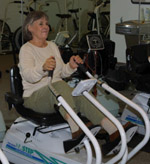Cardiac rehab earns national certification
by Michael BakerPublic Relations
Inside the brightly-lit room, two men exercise diligently on a pair of treadmills. A woman sits on the other side of the room, pumping her legs on a seated stairclimber. In the corner, surrounded by more exercise equipment, Judy Vincent, R.N., looks for improvement in each patient.
While this room showcases just one aspect of MUSC’s cardiac rehabilitation program, the unit as a whole is gaining a healthy reputation.
The Gazes Cardiac Research Institute solidified its national prominence when its cardiac rehabilitation program achieved national certification from the American Association of Cardiovascular and Pulmonary Rehabilitation (AACVPR).
 Margaret
Evitt exercises on a seated stepper as part of her cardiovascular rehabilitation
program in the Gazes building.
Margaret
Evitt exercises on a seated stepper as part of her cardiovascular rehabilitation
program in the Gazes building.
The program, located on the first floor of the Gazes institute, has been certified by the state of South Carolina for almost 20 years, but until now, it had not been nationally recognized. Mark Clair, director of the cardiac rehabilitation program, said the certification is more than just an ego boost for those involved.
“Obviously, being nationally certified looks good on paper,” he said, “but it really shows our commitment to patient care.”
AACVPR certification signifies that MUSC’s program meets the highest standards of knowledge and performance set by the governing association. Patients know they’re receiving the most extensive and effective rehabilitative care available.
“They definitely deserve the recognition,” said Margaret Evitt, a participant in the cardiac rehabilitation program.
And while patient care tops its list of priorities, the program’s high standards have eased its financial burden as well.
To receive full reimbursement from insurance, Medicare requires state certification from cardiac rehabilitation programs. The Gazes program already meets state standards; in the near future, however, Clair said Medicare may provide reimbursement only to programs certified by the AACVPR.
More importantly, MUSC’s cardiac rehabilitation program sought certification in an effort to continuously improve patient care.
“It’s important to those of us at the rehab program that we perform at a high level,” Clair said. “We didn’t want to be ‘forced into’ national certification later on, so we decided to be proactive.”
 Two
patients continue their rehabilitation while Mark Clair, second from left,
demonstrates how to monitor the gauges and operate the treadmill.
Two
patients continue their rehabilitation while Mark Clair, second from left,
demonstrates how to monitor the gauges and operate the treadmill.
Open to patients recovering from specific heart ailments—heart attacks, bypass surgery, and stable angina—the program typically lasts 6 to 12 weeks, depending on the patient’s condition.
Before enrolling, each patient meets with medical director William Barnwell, M.D., to take an “entry stress test.” According to Clair, the test determines how much exercise each patient is capable of doing. Members of the cardiac rehabilitation team use that information to design a program that tailors to the individual’s needs and abilities. Patients exercise three days each week for about an hour.
Although rehabilitation is typically associated with physical work, Clair made it clear that MUSC’s program is multifaceted.
“It’s not just about exercise,” he said. “We incorporate aspects of nursing and physical therapy into patient rehabilitation, and we employ exercise physiologists and dietitians to encourage a heart-healthy lifestyle.”
Clair added that the program prides itself on working with its patients’ physicians in a coordinated approach to rehabilitation.
“We’re not trying to take over the patient’s care,” he said. “We all work as a team. Our collective goal is to prevent these people from needing to come back.”
To that end, each patient receives three progress reports during the course of his or her rehabilitation. The entire process, progress reports included, is documented for each patient, and much of that documentation becomes the application for national certification.
“All of this,” Clair said, nodding to a binder almost two inches thick, “is a compilation of lots of hard work.”
The members of MUSC’s cardiac rehabilitation team—Barnwell, Clair, and Vincent, as well as Jean Houser, R.N., and dietitian Ali Miley—have been working effectively behind the scenes. Now, they’ve earned their spot at center stage.
For more information, physician inquiries, or patient referrals, call
876-5014.
Catalyst Online is published weekly, updated as
needed and improved from time to time by the MUSC Office of Public Relations
for the faculty, employees and students of the Medical University of South
Carolina. Catalyst Online editor, Kim Draughn, can be reached at 792-4107
or by email, catalyst@musc.edu. Editorial copy can be submitted to Catalyst
Online and to The Catalyst in print by fax, 792-6723, or by email to petersnd@musc.edu
or catalyst@musc.edu. To place an ad in The Catalyst hardcopy, call Community
Press at 849-1778.